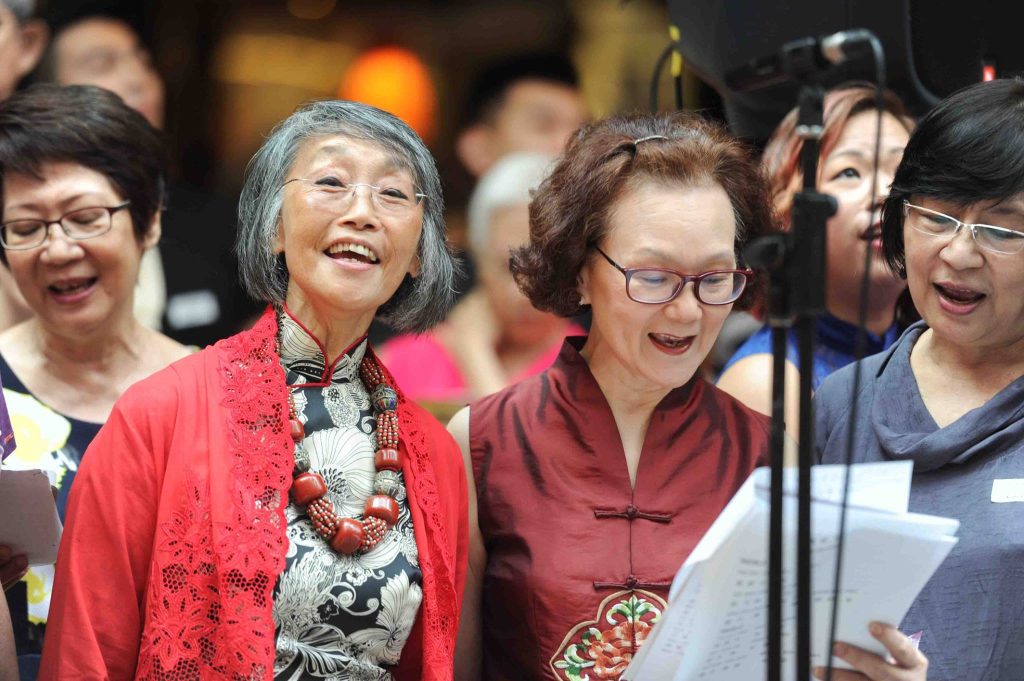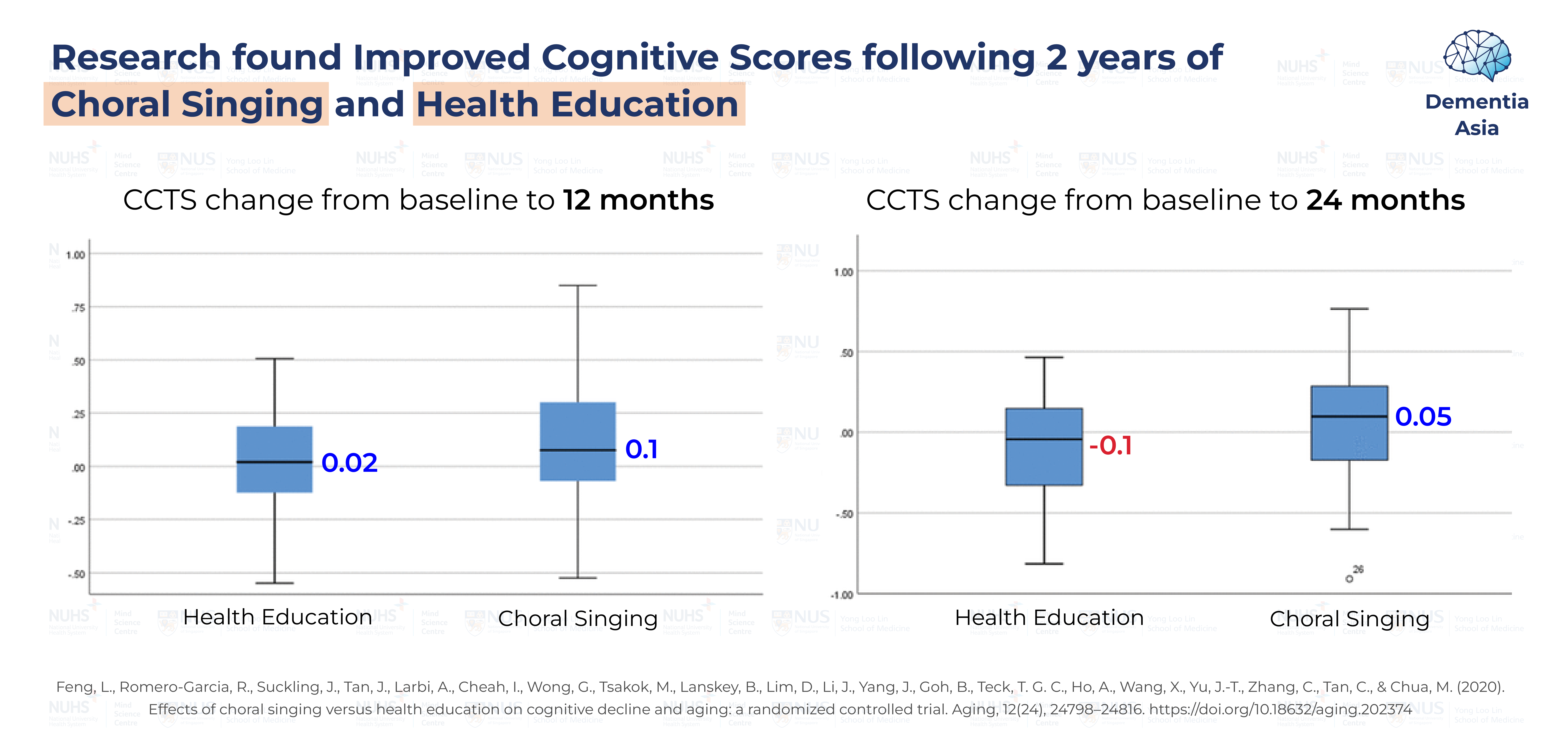Choir Singing to Improve Cognitive Outcomes
In 2021, it is estimated that there are 92,000 people living with dementia in Singapore. The Ministry of Health (MOH) predicts that number to increase to 152,000 by 2030. Now, more than ever, there is a compelling need for preventive interventions to prevent and delay the symptoms of dementia.
Mind Science Centre has been on a mission to study various psychosocial interventions to slow or delay cognitive decline. As part of that project, we embarked on a study to compare the health benefits of choral singing to health education in preventing dementia.
Why Choir Singing?

Choir singing is a cost-effective multi-domain activity that is widely accepted across the globe. The idea for a clinical study was first suggested by Dr Maurine Tsakok, a member of the NUS Society Choir and a former NUS Professor of Obstetrics and Gynaecology.
Our literature review found that there have been numerous studies which suggest the benefits of singing and music interventions for the elderly (Tan et al., 2018). A study found that choir singing brought significant changes in mental health factors including quality of life, anxiety, and depression.
In addition, choir singing is multi-dimensional in that it involves physical, cognitive, social, and affective components. Researchers theorize that this might grant better benefits than activities that target only one single domain.
Mind Science Centre’s 2-Year Randomised Controlled Trial
Our study involved 93 community-dwelling, non-demented seniors who were randomly assigned to two parallel arms:
- Choral Singing Intervention (CSI) or,
- Health Education Programme (HEP)
The study lasted for 2 years in which participants had to join weekly one-hour sessions of their assigned intervention (Feng et al., 2020).
Choral Singing Intervention (CSI)
Weekly sessions were held at the NUS Yong Siew Toh Conservatory of Music. 70 – 80% of the songs were those from the olden days and the other 20 – 30% comprised of new music to promote further cognitive stimulation. To provide added motivation, performances were organised every 3 – 4 months (Kua & Lim, 2022).
Health Education Programme (HEP)
In the weekly sessions, topics of high prevalence to the lives of older adults were discussed. Topics discussed include hypertension, diabetes, dementia, depression, medications, coping with grief, exercise and diet, and social support, amongst many others
This programme is delivered by a panel of healthcare professionals including clinicians, nurses, and psychologists, led by Prof Goh Lee Gan.
Study Results: Improved Cognitive Test Score & Social Connectivity

At the end of the 24-months intervention, an improved Composite Cognitive Test Score (CCTS) was found in both groups (Feng et al., 2020). The CCTS evaluates cognitive function in specific domains such as verbal memory, attention, executive function, visuospatial functioning, information processing speed, and language (Tan et al., 2018).
The CCTS score for the choral singing group increased more than those in the control group, though this difference does not have statistical significance.
This finding shows that choir singing can improve cognitive performance in older adults. It also suggests that choir singing is superior to general health education, though further research is still necessary to draw a definite conclusion.
Above cognitive measures, we also observed improved social connectivity between the participants in the choral singing group. Participants also reported that they enjoyed the choir singing sessions, showing that this intervention has great potential for success when extended to the greater community (Feng et al., 2020).
More Psychosocial Interventions for Dementia

Mind Science Centre’s MAELab in an innovative space for discovery of creative and integrative interventions through art, mindfulness, and transdisciplinary research to promote mental wellness and enhance quality of mind.
Click here to journey through our virtual tour!
References
National Volunteer and Philanthropy Centre. Dementia Colabs Report (2022). https://cityofgood.sg/wp-content/uploads/2022/04/Dementia-Colabs-Public-Report-5-April-2022.pdf
Tan, J., Tsakok, F. H. M., Ow, E. K., Lanskey, B., Lim, K. S. D., Goh, L. G., Tan, C.-H., Cheah, I. K.-M., Larbi, A., Foo, R., Loh, M., Wong, C. K. Y., Suckling, J., Li, J., Mahendran, R., Kua, E.-H., & Feng, L. (2018). Study Protocol for a Randomized Controlled Trial of Choral Singing Intervention to Prevent Cognitive Decline in At-Risk Older Adults Living in the Community. Frontiers in Aging Neuroscience, 10. https://doi.org/10.3389/fnagi.2018.00195
Feng, L., Romero-Garcia, R., Suckling, J., Tan, J., Larbi, A., Cheah, I., Wong, G., Tsakok, M., Lanskey, B., Lim, D., Li, J., Yang, J., Goh, B., Teck, T. G. C., Ho, A., Wang, X., Yu, J.-T., Zhang, C., Tan, C., & Chua, M. (2020). Effects of choral singing versus health education on cognitive decline and aging: a randomized controlled trial. Aging, 12(24), 24798–24816. https://doi.org/10.18632/aging.202374
Kua, E. H. & Lim, D. (2022). Choral Singing. In E. H. Kua & R. Mahendran (Eds.), Ageing with Dignity: A 10-year Study on Positive Ageing and Dementia Prevention in Singapore (pp. 33-37). Write Editions.

